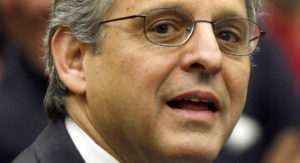Merrick Garland isn’t allowed to campaign actively for partisan political candidates.
You see, he must follow certain judicial canons that prohibit him from such activity.
I’m betting he’s chomping at the bit nonetheless.
Garland is the federal judge who has been nominated for a seat on the U.S. Supreme Court. President Obama made the nomination, only to run straight into a Republican roadblock erected by Senate Majority Leader Mitch McConnell who said the president shouldn’t get to fill the ninth seat on the court; that task should belong to the next president.
McConnell made that demand believing the next president would be a Republican. Then the GOP nominated Donald J. Trump. My gut tells me now that McConnell isn’t too keen on Trump, who I believe is going to lose the presidential election to Democratic nominee Hillary Rodham Clinton.
That eventuality puts Garland back in the driver’s seat.
If Clinton wins, then McConnell well might feel the necessity to proceed with Judiciary Committee hearings and then a floor vote on Garland’s nomination during a lame-duck congressional session.
If Hillary Clinton is the next president, then it’s almost certain that she will nominate someone who is more to the left than the centrist Garland, who Obama chose because of his superb judicial temperament — and the fact that the Senate approved him overwhelmingly to a seat on the D.C. District Court in 1997.
There’s another calculation McConnell needs to make: Clinton’s victory well could swing the Senate’s balance of power back to the Democrats. And that makes it even more critical for the Republicans — who would run the Senate until the new folks take office in January — to at least exert some measure of control over the proceeding.
Yes, this election is important. Don’t you think?
